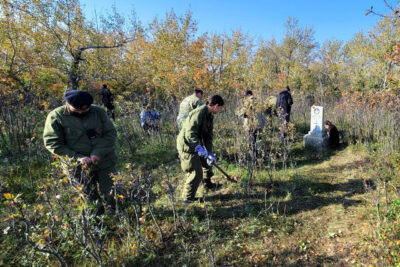Indigenous veterans contributed to Canada’s military legacy
By Lethbridge Herald on November 7, 2022.
 Cadets from Kainai 2384 and Fort Macleod 2309 Royal Canadian Army Cadet Corps remove overgrown grass and bushes from gravesite of Driver Albert Mountain Horse earlier last month. Mountain Horse was the first member of the Blood Tribe to enlist in the First World War, and became the first casualty as he died shortly after arriving back in Canada. His body was returned home from Quebec and he was buried on the Blood Tribe reserve. Photo submitted by Glenn Miller
Cadets from Kainai 2384 and Fort Macleod 2309 Royal Canadian Army Cadet Corps remove overgrown grass and bushes from gravesite of Driver Albert Mountain Horse earlier last month. Mountain Horse was the first member of the Blood Tribe to enlist in the First World War, and became the first casualty as he died shortly after arriving back in Canada. His body was returned home from Quebec and he was buried on the Blood Tribe reserve. Photo submitted by Glenn MillerRy Clarke – LETHBRIDGE HERALD – Local Journalism Initiative Reporter
November 8 is National Indigenous Veterans Day in Canada, a memorial day in recognition of the Indigenous contributions to military service.
Held annually on this day since 1994, it looks to remember the sacrifices many made for this country while overcoming obstacles to serve.
Honouring those soldiers, the Galt Museum and Archives held a session on Friday afternoon on Indigenous Warriors and the contributions the Blackfoot veterans played in our history.
The museum hosted Glenn Miller, local military historian and veteran, to speak with audiences about Indigenous veterans and his work to preserve their honour in Canada.
“Indigenous people were under no obligation to join. When they did and came back, they were not necessarily treated equally. They might have been disenfranchised if they left the reserve. There was a lot of injustices over time,” said Miller. “Not everything is rosy. But moving forward, how do we bridge that reconciliation moving forward in a positive way?”
Working with the Last Post Fund, ensuring no veteran is denied a dignified funeral and burial, Miller has worked across Canada to bring honour to fallen Indigenous soldiers with proper gravestones and memories uniting families with their military history.
“A couple of years ago (the Last Post Fund) started an Indigenous Veterans Initiative,” said Miller. “We look after veterans, who after five-years in an unmarked grave, through Veterans Affairs, get a military-style-marker. Offering the family the opportunity to have their traditional name inscribed on the stone.”
Linking history to service, it is important to remember the fallen during these days of remembrance.
“It is good to see a non-Indigenous ally, like Glenn, helping people find their connection to their ancestors who were veterans and contributed to the war effort,” said Blair Many Fingers, whose ancestor Dave Mills was one of the Kainai and Siksika recruits of the 191st Battalion. “For Indigenous people, being a war veteran is a very honourable thing to do.”
Working with the memory of honour and no soldier being left behind, November 11 is a day to come together and remember the fallen, and pay tribute to all that have fought for Canada and freedom.
“The Kainai Nation will do a ceremony during the day, on Remembrance Day, and in the evening they do a powwow to recognize the significance of the date,” said Miller.
13-12




